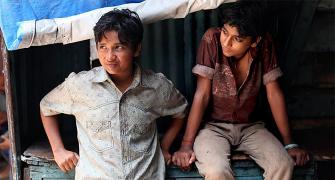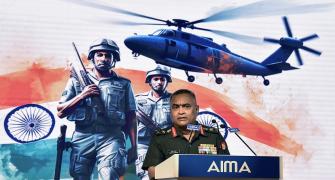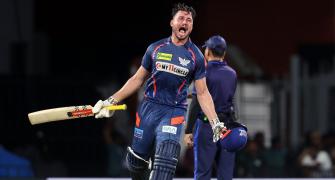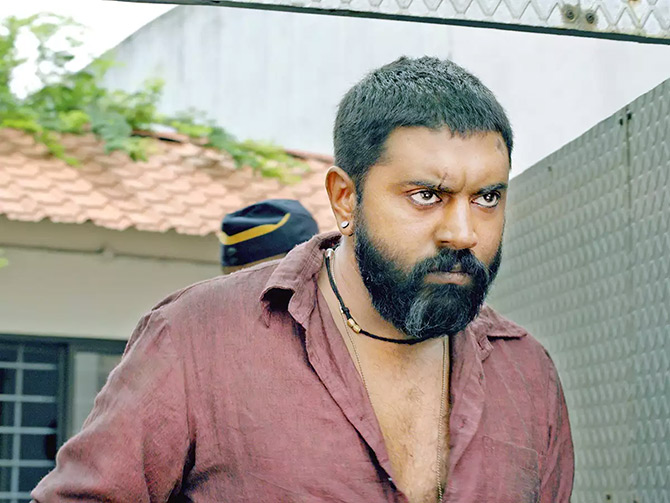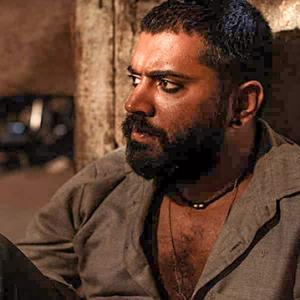All through Moothon, you can sense Geethu Mohandas trying hard to empathise with her characters; I just wish she were interested in them, declares Sreehari Nair.

Geethu Mohandas's Moothon is the equivalent of watching someone perform self-flagellation for close to two hours.
Nivin Pauly plays Akbar, a shadowy figure who skulks about the streets of seedy Mumbai. The man talks in animal grunts and has large, deep eyes which he uses for the sole purpose of staring.
There's a flashback at around the 45-minute mark when we see Akbar in Lakshadweep as a hopeless romantic, although it's plain, even here, that his real talent is for bodily mutilation.
After a failed romance, Akbar has remade himself as a macho Mumbai-based Bhai, but he's also eternally sad, and committed to wasting himself in his den.
Back in Lakshadweep, he would slice his tongue, and now, he injects into his veins all things vile. His masculinity is a façade, and his masochism is out of control -- he has to be the most depressive Bhai in the whole of Mumbai!
Yet, people fear Akbar -- we wonder why.
And Geethu Mohandas wants to move us -- it hardly matters how.
She seems not to realise that in aiming for high tragedy, she has ended up with a castration fantasy.
I can see why the script of Moothon may have hung the moon for those at Sundance: Its detailing of Mumbai;s slum life is so anemic and so one-note that it whets a Westerner's feeling of cultural superiority.
I am no flag-waving patriot, but you don't need patriotism to tell you (some first-hand experience is enough) that people who live in chawls and slums move to their own music and have their own vibrancy.
But it is only exploitation that Mohandas sees!
Oppression and the stereotypes of oppressive stories lurk at every corner. The women have acidic tongues and hearts of gold; the men are, by and large, repressed homosexuals. And when a bar girl starts to dance, every single person present there, as if by dint of well-coordinated choreography, throws cash in her direction.
Such an anemic, humourless, inspired-by-tabloids representation of lower-middle class Mumbai is what the film-festival audience calls 'uncompromising cinema'.
I like to think of it as primitive sentimentality given the veneer of grime.
If the film is researched, the research has clearly been carried out using a tin-eye: Mohandas sees only as far as her plot would allow her to see.
And so, while the atmospheres of the settings have been recreated somewhat dutifully, the little pixels inside those settings all seem over-controlled -- which adds up to the characters having no free-will whatsoever.
This is no minor fault, especially when you come to understand how it dents the larger experience.
Hidden inside the basic story, of 14-year-old Mulla (Sanjana Dipu) who makes the journey from Lakshadweep to Mumbai in search of an older brother, is the central theme: About the dialectic of pride and shame.
But Geethu Mohandas hasn't penetrated the world of the movie in a way that will release the cinematic energy necessary for the story to be told, or the theme to be evoked.
The incidents don't feel weighted dramatically, the events seem rushed, the rhythms of the scenes are all over the place, and the end effect is that of artistry that seems almost neurotically willed.
My guess is that Geethu Mohandas had gone into making her film with a set of immovable theories lodged in the back of her mind: The ill-effects of masculinity, the dangers of men being men, of men acting out their customs of masculinity, the connections between sadism and repressed homosexuality.
But these theories aren't enough to add depth to the people or to the goings-on in their lives.
In a sense, this is also how Madhur Bhandarkar makes his everything-is-shady-in-here movies, and Moothon, at many points, feels like a Bhandarkar movie, aesthetically developed.
Rajeev Ravi, whose cinematography, powers Bhandarkar's finest effort, Chandni Bar, isn't, for once, interested in looking at the city with affectionate, curious eyes -- he shoots this one, as if to preserve the sanctity of Mohandas's theories.
Ideally, you want every scene in a movie to be supplemented by a small prologue and a small epilogue (this goes a long way in making a world come alive for the viewer).
Here, the plot is all: The story keeps roller-coastering. Scenes of exploitation are belted out by the numbers, and in lieu of world-building, you are treated to a few quick documentary-style shots.
The characters don't talk to each other; they merely expand upon the sordid details of crime stories one reads in newspapers (The Hindi dialogues are by Anurag Kashyap).
Even when the images in a movie have no heat, when they lack virility, one can still be comforted by an actor's strong presence.
This ties in with the truth of why most of us go the movies: To see how characters speak and move, to understand what they fear and love, and to use these markers to comprehend their motives.
In Moothon, Mohandas has written over her characters; their only destiny is to keep chasing the milk of liberal kindness that their creator has set out for them, somewhere afar.
Sobhita Dhulipala's Rosie, the sex worker, doesn't belong to this setting.
Dhulipala is a fine performer, but has a tendency to trail off when she isn't able to give her characters a distinct authorial consciousness -- which is the case here.
The actress seems to have been squeezed in, to promote Bollywood's sensitive side, and Rosie doesn't seem like that she has sprouted from the ground she is standing on: She sticks out in an obvious sort of way; as though she has fallen from the heavens and landed in Kamathipura.
Dhulipala, however, gets the movie's only scene of real twinkle when she drives away a customer who wants her to bear his child. It is the kind of comical aside that was present in almost every frame of Love Sonia, a movie similar in texture to Moothon, but one in which everything felt vivid and everything breathed.
I am not sure whether to blame Shashank Arora or his directors for not having the imagination to present the talented actor as something other than the face of relentless nihilism.
Like Neeraj Kabi, Arora, too, has a deep-set countenance, which, however arresting, wears you down after a certain point.
In this movie, he plays Salim, Akbar's stooge, and though always there, nothing develops in his character: he starts off as frigid and ends up as icy cold.
I liked Sujith Shankar here (Jimson of Maheshinte Prathikaram) who brings a nip of frenzied energy to his scenes as the eunuch who encourages Mulla to put on make-up.
Then there is Nivin Pauly trying hard to prove himself a serious actor and it is like Spielberg trying for sincerity -- the effort reeks of discomfort.
Also, let's just get this off our chest: There is nothing automatically courageous about an actor playing a homosexual.
I don't understand the trumpets that go off every time someone accepts a gay part: The announcement gets the liberal audience on your side, and so, for most actors, merely the idea of playing a homosexual becomes validation enough.
The real challenge for an actor may be playing a wife-beater or a pedophile and giving such characters genuine three-dimensionality -- I say there's courage in that! Or perhaps, we're talking talent.
Nivin Pauly's energy pours out in its fullness -- and I don't mean this disparagingly -- in films like Oru Vadakkan Selfie; when he turns classically esteemed qualities like rigidity into a shared joke. His Akbar, here, is an island of rigid rituals: he's the sort of person that a bouncy Pauly character, in another film, would have laughed at from a distance.
In fact, Pauly's finest moment of acting in Moothon occurs when he attempts to tell his mute lover that the nuances of sign language are lost on him. That part of the Malayali psyche that doesn't take itself, or anyone, too seriously is Nivin Pauly's sweet spot -- and to expect someone like that to pull off a character who is constantly seeking some kind of spiritual deliverance is an unfair expectation.
Roshan Mathew, who plays Ameer, Akbar's mute lover, descends upon Moothon in a manner that is in stark contrast with the rest of the movie (it's not that difficult to see why audiences have connected so much with Mathew's section of the movie: That on-the-nose sensuality which Ameer brings forth, is a big relief from all the pounding).
Geethu Mohandas gives Ameer a certain freeness -- he almost floats into the narrative, and then grows in stature by following the need of his body, never eager to make statements. Mohandas photographs him lovingly, as an attractive satyr on vacation, a dervish who seems to be dancing even when he gets into a fight with another man.
There's nothing pent-up in Ameer, and that's part of his appeal; he has a sense of humour even when he shows Akbar the scars on his face.
Like Ameer, the kids in Moothon also come off as conceived in dreams, and this gives them a force that compels us to look at them carefully.
If, with the exception of the divine Ameer and the angelic kids, you find yourself wincing at everyone else, it is because of a cardinal flaw in the film's sensibility.
Moothon wants to peer into a hard-edged world, but its vision is rather soft.
This is a film that sees the innocence in children (though children can be both innocent and cruel), and the beauty in femininity (though femininity can be both beautiful and destructive), but all those attributes that people have traditionally perceived as *manly* (this includes attributes such as courage and strength) the film sees as unspeakably ugly.
It is perfectly okay that Geethu Mohandas holds such beliefs, but it is a drag when she uses them to write over her characters, thereby robbing these characters of their individuality.
In Moothon, any man who carries in his heart the slightest bit of violence is shown to be slouching towards doomsday -- and while such a skewed portrayal may prop up Mohandas's social project, it doesn't, at all, work as a piece of artistic conception.
You don't want a celebration of chest-beating masculinity; you don't want to see masculinity being projected as something inherently hideous either -- both of these approaches offer the same payoff: Bad melodrama.
Moothon also proves that it’s the progressive mind that breeds what I call 'kindness most short-sighted'.
When consumed by this brand of kindness, you apologise for your own privileges by overdoing the disparities between you and someone less privileged than you -- thereby reducing their range of meaning, and undercutting their life experiences.
And it's on this point that any comparison of Moothon and Salaam Bombay starts to feel inappropriate.
Mira Nair made that film not out of kindness, but because she was drawn to her characters whose vitality burst out of their cramped spaces.
To Geethu Mohandas, however, these are little people stuck in their tiny rooms and narrow lanes, with zero prospects, and with their pointless lives furnishing the arena for her tragedy to play out.
All through Moothon, you can sense Mohandas trying hard to empathise with her characters; I just wish she were interested in them.




